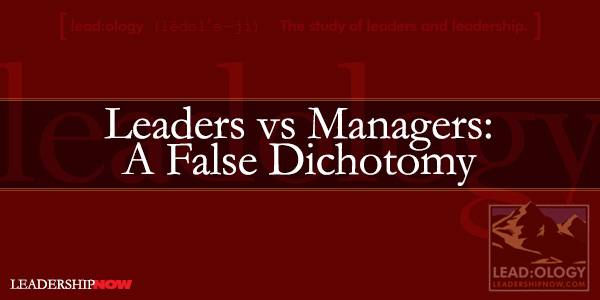 Leading Blog | Posts by Category |
 Leading Blog | Posts by Category |
05.12.10

lead:ology - What is Leadership?
The fact that there are so many and assorted definitions of leadership speaks to the very human aspect of leadership. It is as varied as there are leaders and leadership needs. A good definition needs to allow many perspectives. It should create awareness. It should include leaders at all levels. It should raise more questions than it answers. It should lead to who, why, where, and how. Who is a leader? Why do they lead? In what context? When are they leading? How do we know? How do we evaluate it? Our definition of leadership is important because it mirrors our perspective of leadership. Do we believe leaders are born or are they made? Is it for a select few, or can anyone make a difference? A definition of good leadership is different from a definition of what leadership is. Defining good leadership is a separate issue. Leadership, like power, is value-neutral. It isn’t inherently good or bad. It becomes good or bad depending on what we do with it. And humankind has done all kinds of things with it. Consequently, we have good leaders and bad leaders. Some definitions try to define away bad leaders as if to say, “Bad leaders cannot really be considered leaders at all.” It is an attempt to define away our humanity. The problem is bad leaders are very real. They exist and they cause harm. With their leadership skills, they play upon the worst in people and lead them into destructive thinking and behavior. This cavalier approach to leadership is a disservice to the study of leadership and undermines a serious understanding of the potential of leadership for good or bad. Good leaders and bad leaders have a lot more in common when it comes to leadership than we might like to think. Being human, we have the potential to corrupt anything we touch and an awareness of this is important. Archbishop Desmond Tutu said that his experience has taught him two things: “we have this extraordinary capacity for good” and we “have a remarkable capacity for evil.” Armed with this understanding and the examples of those who have sadly corrupted those they led, we can better appreciate what we can do to maximize good leadership and minimize bad leadership. Defining bad leadership away undermines the importance of the values we associate with good leadership such as good character, humility, integrity, and selflessness. A definition that allows that some leadership is bad can help to save us from our own hubris. Most definitions create an impoverished view of leadership. Narrow business-centric definitions are not inclusive of all leaders at all levels and in all contexts. They are misleading. Leadership is far more complex and varied than most definitions would lead us to believe. Most definitions still reinforce the idea that leadership is positional. Acts of leadership by leaders with no title are dismissed. No definition for the study of leadership should be considered if it does not reflect the rich variety of leadership and is not inclusive of all potential leaders. A working definition for the study of leadership needs to include leaders of all kinds, not just the leaders we find easy to identify. Certainly, leadership is about shared values, vision and results. It is exemplified through the work people do, the attitudes they adopt and the potential they realize. But it all begins with an intention to influence others. Most definitions tackle the how of leadership not the what. It is the how where we spend a lifetime working to improve our effectiveness at influencing. The what of leadership is simpler. Leadership is intentional influence.
Posted by Michael McKinney at 12:21 PM
06.22.09

lead:ology - Leaders vs Managers: A False Dichotomy
The distinctions made by Bennis are important as they expose two very different and equally valuable mindsets. As each works best in the presence of the other, it is to our advantage that we possess and practice both. As the Teacher so wisely expressed in Ecclesiastes, “There is a time for everything.” It is through a developed sense of awareness and experience that we are able to determine which mindset we need to employ, relative to what and when. We are inclined by our own nature and encouraged by our educational system to favor management. We are content reproducing what we already know—or think we know. We have learned from the neurosciences that the mind is wired for efficiency and is most comfortable reproducing a limited range of responses to help us to better manage and make sense of our world. Management would seem to be our biological default as we tend toward the status quo—to equilibrium—and often for very life-sustaining reasons. But we need leadership to move us out of our comfort zone and grow to new possibilities. It is in the tension between the two—management and leadership—that we can be effective and relevant. Different roles, different results. Thus, both of these roles are needed not only on a personal level but also on a larger organizational level if we are to function efficiently and grow. Management is based on the response to the questions we had yesterday. Today, some of those responses are still valid, many are not. Leadership is needed to address the questions of today and bring us to a different place. This is especially true in times of great change. As noted in Presence: “Our actions are most likely to revert to what is habitual when we are in a state of fear or anxiety…. Even as conditions in the world change dramatically, most businesses, governments, schools, and other large organizations, driven by fear, continue to take the same kinds of institutional actions that they always have…. At best, we get better at what we have always done. We remain secure in the concern of our own worldview, isolated from the larger world.” Debates about which role is better, misses the point. The list isn’t about labels. It’s about different roles that produce different results. By creating a leader-manager distinction, by pulling them apart, we get a better sense of how they fit together. John Kotter makes this clear in What Leaders Really Do: The point here is not that leadership is good and management is bad. They are simply different and serve different purposes. The fundamental purpose of management is to keep the current system functioning. The fundamental purpose of leadership is to produce useful change, especially non-incremental change. It is possible to have too much or too little of either. Strong leadership with no management risks chaos; the organization might walk right off a cliff. Strong management with no leadership tends to entrench an organization in deadly bureaucracy. Management gives leadership a foundation to work from. Leadership keeps us growing and relevant. If a leader can not manage what they have created, then their leadership is not effective and serves no end. I asked Warren Bennis about his thoughts concerning the Leader-Manager distinction twenty years after they were first put into print: Unfortunately and unintentionally, my '89 book, On Becoming a Leader doesn't emphasize the role of and the need for effective managers. I thought then and still think that the distinction is a valid one. At the time I wrote about the differences, I believed that most organizations were under-led and over-managed. I still believe that's true of many of today's organizations. So while I still believe that distinction is still important, what I should have made much, much clearer is that both are important and sometimes those qualities are embodied in many exemplary leaders and, to repeat myself, both are important. If I had made that clearer and added that it's ridiculous to get polarized on the horns of a false dichotomy, I think a lot of folks would have welcomed that distinction. The best leaders I know are both leaders and managers. Warren Bennis’ list of distinctions helps us to understand that as leaders, we can get so busy serving the system that we actually create barriers to leadership. We can easily fall into the trap of leading only to manage what we have created. Leadership is about continually asking the right, challenging questions. It is about renewal. Curiously, we manage better when we chose to lead.
Posted by Michael McKinney at 09:56 AM
01.14.09

lead:ology - Leadership: Whence It Came, Where It Went
The earliest practitioners knew in principle what we know today. We aren’t the first to have learned how to lead, but in no other time have we tried to quantify it like we do today. Our scientific approach and thinking, while of great value, has really only added to our understanding of the why. Though we are drawn to binary reasoning and absolutes, leadership does not lend itself to that kind of thinking nor is it practiced that way. It is not rigid in nature. In the study of leadership as in much else, complexity is used to hide the truth rather than reveal it. The general principles of human behavior are not complex and are available to everyone. For some, it seems only right that something so important should be shrouded in mystery. We would be well advised not to make the simple complex. Leadership creates ample opportunity for nuances of thought to be displayed in other ways. At the same time, while leadership is not complex, it isn’t easy. Make no mistake. Leadership is hard. It is fashionable to raise leadership above the common man, yet it is in the common man that leadership resides and from the common man, that leadership must rise to meet the challenges of the time. Leadership is common to us all—men and women—if we will but choose it. Where are all the leaders? This is a persistent question. Actually, leaders are all around us. More often the problem we are lamenting is the lack of character we need in our leaders; the need for selflessness. Leaders reflect the society from which they come. If we don’t like what we see, we have to grapple with the fact that we are rewarding, nourishing and displaying the wrong behaviors in our homes, our schools, and our churches. We need to take a hard look at these crucibles were our leaders are made. It is silly to endlessly attack what we have produced and do nothing about the source of the problem. We need to get the fundamentals right. Poor leadership is a self-inflicted wound. At the same time, we as followers are a fickle lot. We don’t always feel we need leaders. When times are difficult and the choices not so clear, we clamor for someone to lead us. When times are easy, we are ambivalent towards leadership. We would prefer to have no one telling us what we should do, guiding us to make distinctions or inspiring us to be more than we are. We like things just the way they are. Nothing more consistently troubles the human mind than to be presented with a new direction when things are going well. This human tendency no doubt led Peter Drucker to observe that leadership is a foul-weather job. We want a leader to save us; to take away the discomfort. But a great leader never does. A great leader never does for people what they can and should do for themselves. A great leader guides, demonstrates direction, and provides encouragement. If history teaches us anything, we learn that leadership is temporary and so it must be constantly renewed both individually and collectively. From history, we also see how the context of leadership changes and so then its form must also adapt. Experiencing leadership is a lot easier than doing leadership. It’s more comfortable to push it off on someone else than to expose ourselves by taking up the task. But it is a task we all must embrace at some level if we are to create a future for ourselves and others. Find your future in your present and let your passion and the needs of those around you, be your guide.
Posted by Michael McKinney at 01:12 AM
|
BUILD YOUR KNOWLEDGE


How to Do Your Start-Up Right STRAIGHT TALK FOR START-UPS 
Grow Your Leadership Skills NEW AND UPCOMING LEADERSHIP BOOKS 
Leadership Minute BITE-SIZE CONCEPTS YOU CAN CHEW ON 
Classic Leadership Books BOOKS TO READ BEFORE YOU LEAD |
|